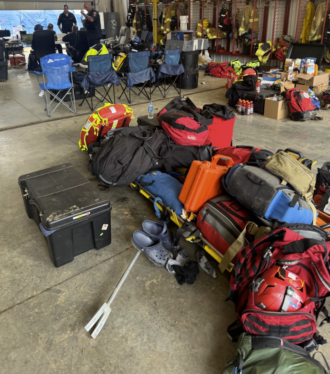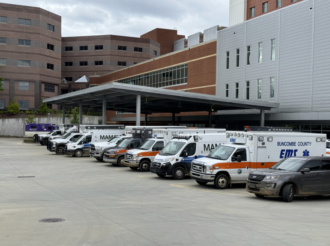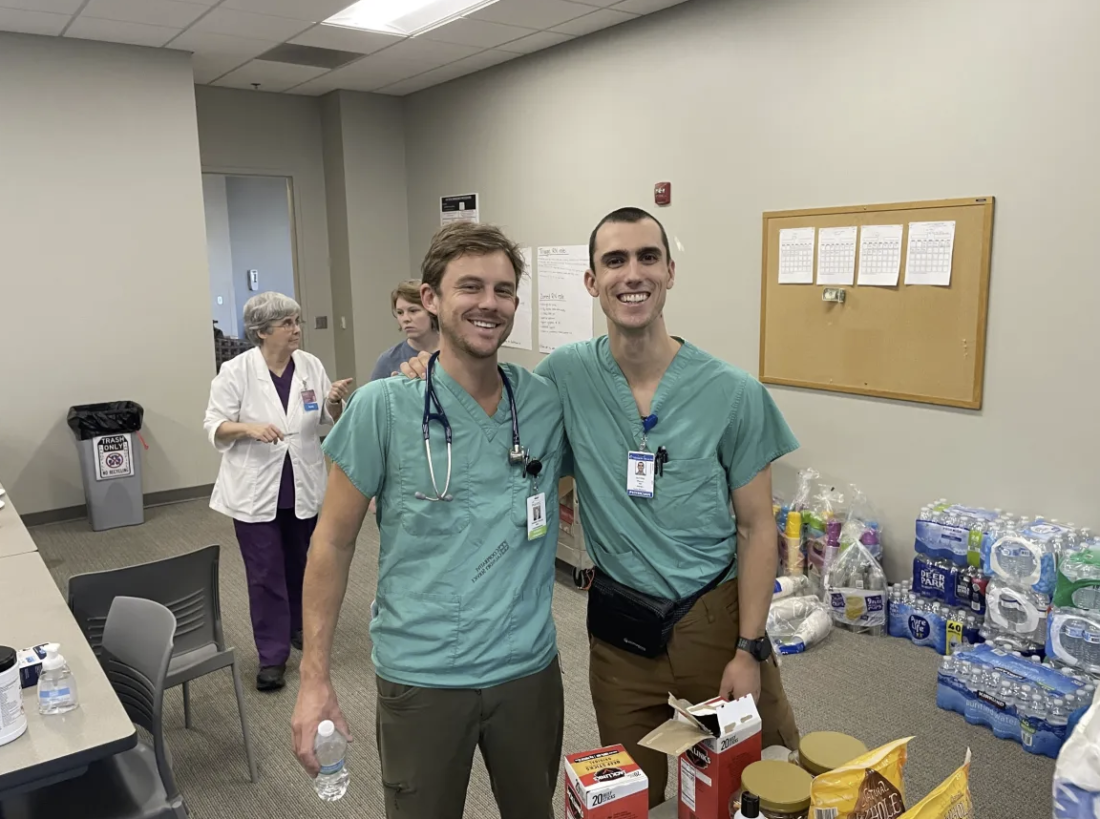To Dr. Ruchi Moore and her colleagues at Asheville’s Laurel OB/GYN, Hurricane Helene’s onslaught felt like a rerun of the COVID-19 pandemic “plus just an insane snowstorm.”
The storm shuttered the practice, leaving patients in crisis, and destroyed one employee’s home. But Moore and her staff plan to reopen today, even though they lack water.
“I will see any pregnant woman,” Moore said. “We’re going to try to see patients between 10 a.m. and 1 p.m., and just see if there’s anybody who needs to come listen to their baby’s heart tones, just feel reassured that their baby’s alive and all is well. If we can do blood pressures on people and just make sure they’re fine, that is our goal.”
Across the region, doctors are working feverishly to see their patients, navigating through cell phone and Wi-Fi outages in an effort to communicate and ensure they receive care and medications. In hospital operating rooms, the halls of emergency shelters, and on the front lines of rescue efforts, doctors may be strained by the patient load and their own losses but they are driven by purpose.
Dr. Martin Palmeri, an oncologist at Messino Cancer Centers in Asheville and president of the North Carolina Oncology Association, called roughly 100 patients after the storm and got hold of only about 15-20.
“Basically, I’m just checking to make sure they’re safe, checking to make sure they’re well,” Palmeri told Asheville Watchdog.
Messino Cancer Centers has six clinics across the region. It lost one in Spruce Pine to heavy damage, but water and power are back at some others. Though his staff are all safe and accounted for, Palmeri said, circumstances are forcing him to send some patients to doctors outside the region.
“For some of my patients, if we can’t provide the services they need at the moment here, we make sure that we get them to where they can get the services they need, and then for the ones that we can accommodate, just getting them back on the schedule,” Palmeri said.
Physicians are trying to create ways to connect people with checkups and treatment.
Dr. Mike Weizman, co-founder of Our Family Doctor, gave his staff time off to deal with their own challenges and then set up a walk-in clinic at the offices near A-B Tech’s campus.
Weizman’s office sent out a text message to patients, but was worried not all of them saw it. Only 10 people showed up for the clinic Tuesday, the first day it was open.
A lot of people have left town, Weizman said. But there’s still a risk of missed connections.
“I had a patient over the weekend who needed us,” Weizman said. “She couldn’t get a hold of us, so she went to the ER, they stabilized her, and she followed up with us today. She was thrilled that we had this clinic and we were able to manage her acute asthma and her diabetes today that the ER appropriately handled on Saturday when we were out of pocket. So, that was very frustrating. Not being able to be there for our patients over the weekend was frustrating for them and frustrating for us as doctors. There’s literally nothing we could do.”
Dr. Stephen Weinrib, an endocrinologist at Mountain Area Health Education Center, is at his brother’s house in Charlotte, set up to do appointments remotely after the storm damaged his home.
Dr. Brian Edwards with Carolina Internal Medicine had to leave his family in Durham, maybe for months, and came back to Asheville to take care of his patients.
“Everybody is doing everything they can to get these people cared for,” Edwards said. “But there’s a lot of people who were already kind of living on the margins, and this is just going to push them over.”

Some patients with the resources to do so have fled the state, Moore said.
Those with less stayed.
“If your whole social network is economically depressed, then that gives less resources for you to be able to go to Charlotte, to be able to go to Atlanta,” Moore said. “And so I know those women are definitely at a disadvantage already, and then you put a hurricane and this devastation, and it’s going to make those disparities even more pronounced.”
Dr. C.J. Atkinson, a Novant Health system physician executive, drove up to Black Mountain and joined a rescue team to help get a woman who needed an C-section off a mountain and check in on a collapsing shelter.
It was “all hands on deck,” Atkinson said, praising the other doctors, EMS workers and government entities that crafted the rescue response. “And we’re going to keep going to try to figure it out,” he said. ”The people who are up there are just amazing.”
He said Thursday night he was headed back into the field.
‘This is like what we train for’
Dr. Red Hoffman, a critical care surgeon at Mission Hospital, saw the first wave of patients traumatically injured Friday and Saturday nights, scenes she called “harrowing and sad.
“This is like what we train for,” Hoffman said. “We’re more than prepared. I think the sense of camaraderie amongst the medical staff in general has been at exactly what one would hope for.”
Dr. Boone Marois, a family medicine physician at MAHEC, found himself medical director of an emergency shelter set up in corridors of A-B Tech’s Ferguson Center.
Between weaving his way through beds in A-B Tech’s emergency shelter, Marois talked about the stark difference between clinical practice and managing Helene patients.
“I think it kind of brings us back to why a lot of us got into doctoring in the first place,” Marois said.
Outside the room where he and medical staff operated, patients lay in beds, some on oxygen machines, some sleeping, some chatting with each other, more coming in via ambulance. These are people who could be at home under normal circumstances, but without power and water, they wouldn’t be medically stable.

“We’re taking patients to the bathroom, we’re helping patients with basic medicine administration or helping them with the basic day to day living items. And we’ve been getting progressively more organized.”
At Mission Hospital, which lacked running water and was trucking in a water supply, Dr. Raymond Barfield, a hospice and palliative care doctor, said he’s seen a mix of support, camaraderie, and loss.
“I’m seeing a lot of shock,” he said of patients.
“I was in this meeting where we’re talking about logistics and plans that we have twice a day and an orthopedic surgeon there said that he had had seven femur repairs in the operating room the day before… And so the kinds of injuries that you’re going to see, they’re just going to become more frequent.”
Camaraderie and sadness
Hoffman, like Moore, said the aftermath of Helene feels like the COVID-19 pandemic: Fear, scarcity, fragile patients and personal losses abound.
The hurricane response is a reminder to her of how close knit the medical community is.
“We all are part of a medical community and here to help one another, which I think we do really well in western North Carolina,” she said. “Right now, we’re all calling our colleagues and saying, ‘Can you help us?’”
She’s told her residents and her colleagues that it’s OK to take a moment and “feel sad for ourselves.”
“Gratitude and sadness can exist together. It’s OK to feel both.’”
Moore helped deliver at least five babies over the weekend, she said. And she’s ready to get back to work because she knows the risks her patients will face in the coming weeks and months.
“We’re in a state that has a high maternal mortality rate for OB, and a lot of it is because of disparities in healthcare, because of various … socioeconomic issues going into pregnancy and then throughout pregnancy,” Moore said. “And now we’re adding this unbelievable emotional and physical stress to patients… and we’re not even being able to monitor them or their babies.’”
But she’s also tired and overwhelmed.
“There are just a lot of moving parts, and I’m trying to figure out how to use the skills I have and these abilities I have, and how can I serve my community?” she said. ”How can I help people? How can I take care of my neighbors and the people I live with, but also keep reserve?”
Asheville Watchdog is a nonprofit news team producing stories that matter to Asheville and Buncombe County. Andrew R. Jones is a Watchdog investigative reporter. Email arjones@avlwatchdog.org. The Watchdog’s reporting is made possible by donations from the community. To show your support for this vital public service go to avlwatchdog.org/support-our-publication/.




Before you comment
The comments section is here to provide a platform for civil dialogue on the issues we face together as a local community. Xpress is committed to offering this platform for all voices, but when the tone of the discussion gets nasty or strays off topic, we believe many people choose not to participate. Xpress editors are determined to moderate comments to ensure a constructive interchange is maintained. All comments judged not to be in keeping with the spirit of civil discourse will be removed and repeat violators will be banned. See here for our terms of service. Thank you for being part of this effort to promote respectful discussion.